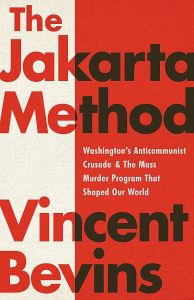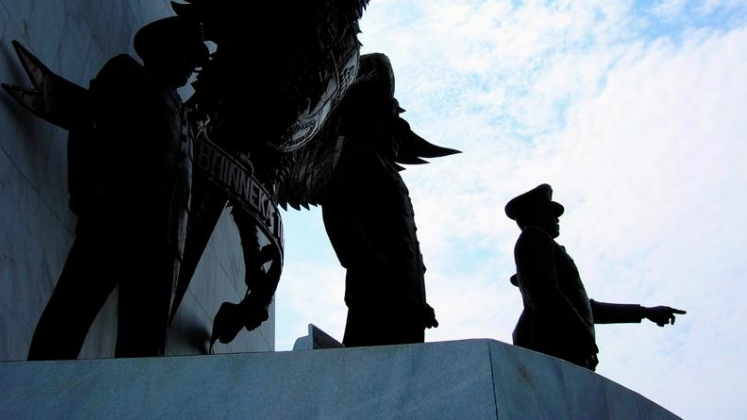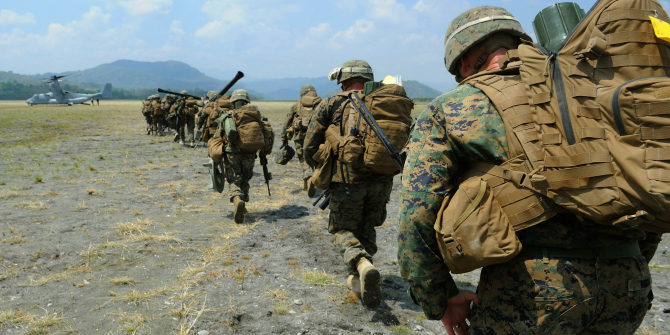In The Jakarta Method, Vincent Bevins explores the US role in the mass killings in Indonesia in 1965-66 as well as military coups in Latin America to show the consequences of Washington’s Cold War interventions in the present day. This is a well-researched, tightly written and emotionally affecting book, writes Thomas Kingston.
The Jakarta Method: Washington’s Anticommunist Crusade and the Mass Murder Program That Shaped Our World. Vincent Bevins. PublicAffairs. 2020.
 Ask most people what they associate with Copacabana in Brazil and Seminyak in Bali, and it’s likely to be a tropical idyll. However, The Jakarta Method, the new book by Vincent Bevins, might just change that. These palm-fringed sands take on a darker aspect when one learns of their prominent roles in a transcontinental web of political intrigue, mass killings and the assertion of US hegemony, with Seminyak playing host to mass graves and Copacabana a recurring location for far-right agitation. Bevins, a California-born journalist with a fascinating career that has seen him stationed in London for the Financial Times, Brazil for the LA Times and Jakarta for the Washington Post wrote this book on ‘US-backed mass murder in Indonesia, military coups in Latin America, and the ways Washington’s Cold War interventions have shaped life in the entire “developing” world to this day’. Though receiving some initial criticism, he has managed to craft an excellent book, and I don’t write that lightly. He weaves interviews with academic sources, backroom CIA dealings with thwarted dreams of would-be revolutionaries, and delivers a well-researched and tightly written work that is at times extremely provocative, both politically and emotionally.
Ask most people what they associate with Copacabana in Brazil and Seminyak in Bali, and it’s likely to be a tropical idyll. However, The Jakarta Method, the new book by Vincent Bevins, might just change that. These palm-fringed sands take on a darker aspect when one learns of their prominent roles in a transcontinental web of political intrigue, mass killings and the assertion of US hegemony, with Seminyak playing host to mass graves and Copacabana a recurring location for far-right agitation. Bevins, a California-born journalist with a fascinating career that has seen him stationed in London for the Financial Times, Brazil for the LA Times and Jakarta for the Washington Post wrote this book on ‘US-backed mass murder in Indonesia, military coups in Latin America, and the ways Washington’s Cold War interventions have shaped life in the entire “developing” world to this day’. Though receiving some initial criticism, he has managed to craft an excellent book, and I don’t write that lightly. He weaves interviews with academic sources, backroom CIA dealings with thwarted dreams of would-be revolutionaries, and delivers a well-researched and tightly written work that is at times extremely provocative, both politically and emotionally.
Whilst US interventions in Iraq and Afghanistan are still a recent memory, with raw and ongoing consequences for millions, this book looks back beyond the ‘War on Terror’ and depicts the evolution of US policy towards opponents on the international stage during the Cold War, with most narrated events occurring in the 1960s and 1970s. I use the word ‘opponents’ because despite the subtitle referring to ‘Washington’s Anticommunist Crusade’, this campaign often found its victims amongst people who simply represented a slight chance of threatening the interests of Washington. The CIA set out to fight Communism and protect the rights of multinational corporations, but appeared, more often than not, to be more concerned with the latter than the former.
Such was the scale of CIA involvement that the reader is at times almost left reeling by the jetsetting of the text, at one moment in Iran, then in Guatemala, followed by a sojourn in the USA before it tackles the main countries featured, Indonesia and then Brazil. The book then heads to Chile, returns to Brazil, Indonesia and Guatemala, and ends up in an office in 30 Rockefeller Plaza, perhaps better known for its central role in a sitcom.
Some of the episodes featured will be more familiar than others, with the Indonesian Mass Killings of 1965-66 having recently been brought to global attention by the critically acclaimed 2012 documentary, The Act of Killing. While Joshua Oppenheimer’s film placed those responsible for the killings in the public eye, this book depicts the victims themselves in a way that emphasises their humanity, a quality that was so long denied. For example, one of the people presented in the book is a young Indonesian woman seeking her fortune in the capital Jakarta, only to find herself marked out for punishment due to suspected Communist ties simply for being in a union. Due to this, she experiences years of torture, rape and imprisonment as well as ostracism in the present day.
Alongside these personal stories is the bigger picture of the Partai Komunis Indonesia (PKI) – then the third largest Communist Party in the world (and largest non-ruling) with up to three million members – being crushed almost overnight, resulting in the estimated deaths of up to one million people. What is particularly notable about this is that rather than the costly ‘boots on the ground’ intervention seen in Vietnam, this was carried out by domestic players: in this case, the Indonesian armed forces and political vigilantes, with significant CIA/US State Department support. This ‘scorched earth’ approach to the complete annihilation of opponents via proxies, whether through mass murder or campaigns of terror, led to the titular ‘Jakarta Method’ of suppression and extermination being exported around the world, with the CIA often acting as the common element in these atrocities.

US involvement in Latin America will not come as news to many, but the brutality and paranoia it encouraged might. In Guatemala we see indigenous Mayans preemptively killed due to their potential to be left-wing sympathisers, and Jacobo Árbenz, a democratically elected President with a deep commitment to capitalism, is overthrown thanks to a corporation with the ear of the US. The United Fruit Company, infamous for its monopolistic control of banana production in the so-called ‘banana republics’, took issue with the fact that the land reform programme proposed by Árbenz would only compensate them for the value of their land declared for taxation purposes, which they’d been undervaluing for years in order to avoid taxes. As a result of this, Árbenz was portrayed as a Communist and overthrown; his US-backed replacement, Carlos Castillo Armas, is said by Bevins to have brought back slavery, whilst also encouraging widespread killing of alleged Communists and other leftists that might be a threat to the regime. Figures like Margaret Thatcher’s Chilean ally, General Augusto Pinochet, might be more familiar to British readers, but the full extent of the terror of his rule might come as news to some as well as his involvement in the continent-wide campaign of repression and death squads known as ‘Operation Condor’, backed by successive US administrations, both Democrat and Republican.
As mentioned earlier, Brazil plays a central role in this book, acting as a second axis that at times overlaps with Indonesia, both in terms of policy and, via Bevin’s combination of storytelling and interviews, the individuals involved. Through this, we see Brazil’s back-and-forth between military and democratic rule cast in a new light with US support, and Indonesian-inspired tactics playing a key role in a crusade that labels anything opposed to big business and US interests as ‘socialist’ or even ‘Communist’, with a cruel trick of fate meaning some of those who fled Indonesia’s purges now bear witness to a new wave of violence in their supposed safe haven of Brazil.
The book depicts moments that are almost comically absurd – such as Bevins reporting that the CIA worked with Bing Crosby and his brother Larry to produce an unreleased pornographic film that featured an actor impersonating the left-leaning Indonesian President Sukarno in order to discredit him, before they realised his perceived virility was actually part of his popularity; or, in an even darker way, US forces in the Philippines propagating myths of bloodsucking monsters as an alibi for the desecration of the corpses of rebels. Yet, these stories are always followed by the overwhelming scale of death and terror carried out. Further complicating the emotional tug of war is the recurring and almost ghostly presence of a positive future that might have been, which is brought to life via the interviews conducted by Bevins that are included at the end of the book. To readers of this review, it might seem odd to repeatedly mention these emotional aspects, but at times I had to put the book down due to an almost incandescent sense of injustice; at other moments, I turned to comic relief to avoid dwelling on the horrors that had just been depicted. As someone who doesn’t usually find themselves that emotionally affected by books, this was quite unsettling.
One can imagine The Jakarta Method being reduced to an anti-American diatribe, but that would be an inaccurate and unfair summary of a book that manages to piece together events that have often been relatively unknown outside of academic or activist circles. Personally, whilst familiar with the 1965-66 mass killings in Indonesia, I wasn’t aware of their echoes and influence around the world, leading me to believe that this book could be enlightening for most readers. I also imagine critics may target the lack of focus on Communist-led terror and killings, but Bevins offers a satisfactory explanation for this in the closing chapters, highlighting the wealth of works already dedicated to the crimes of self-proclaimed Communist regimes.
Ultimately, it’s hard to envisage how you would write a balanced account of what were often unilateral actions in pursuit of ideological intangibles that resulted in death and misery for millions. Perhaps the best and most simple example of this can be found in the book’s final pages, when Bevins, asking an Indonesian political activist/survivor ‘How did we win [the Cold War]?’, receives the answer: ‘You killed us.’
Note: This review gives the views of the author, and not the position of the LSE Review of Books blog, or of the London School of Economics.
Image Credit: Pancasila Sakti monument in Jakarta, built during the rule of Suharto, marking the killing of six senior Indonesian army generals on 30 September 1965. Propagated as being an attempted Communist coup, this event precipitated the mass killings of 1965-66 and the coming to power of Suharto (Chez Julius Livre 1 CC BY NC ND 2.0).







